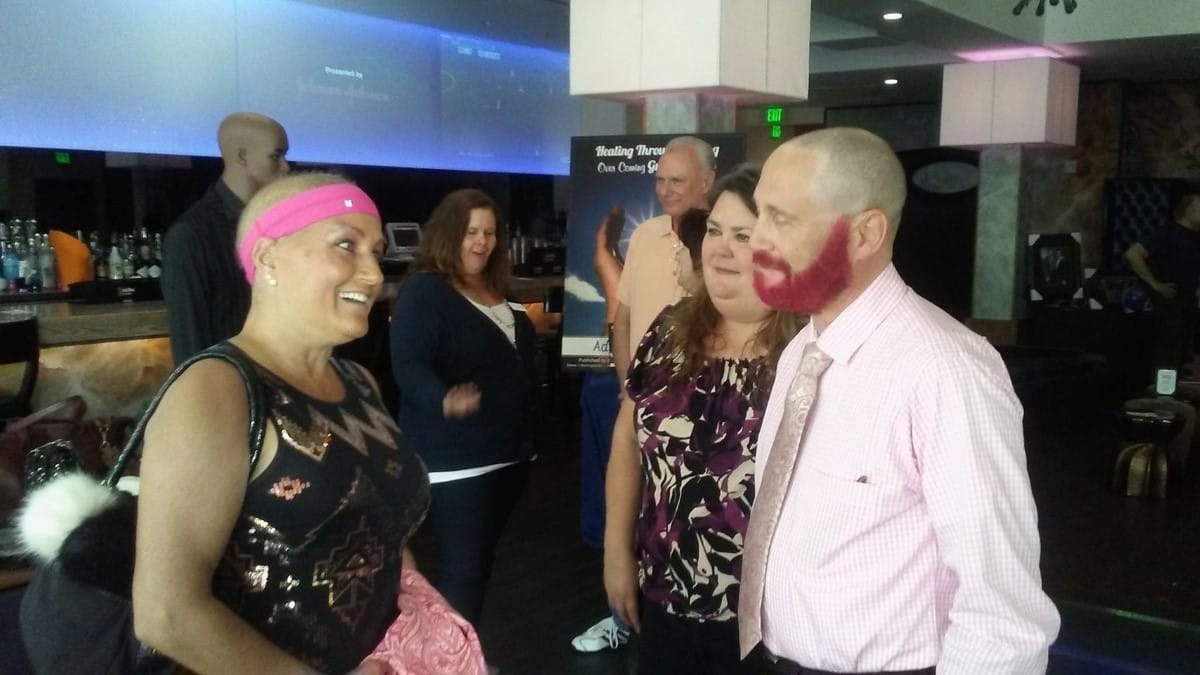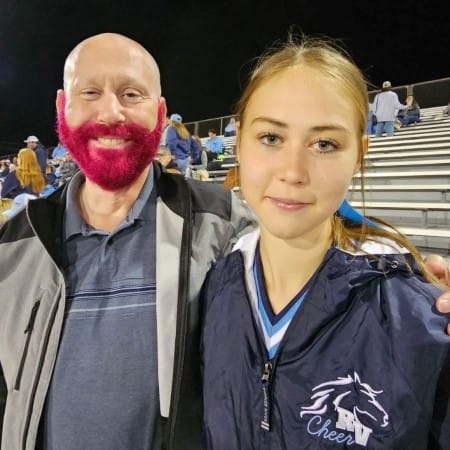From Loss to Support: Finding Peace in Helping

Meet Daily Point of Light Award honoree Adam Katz. Read his story, and nominate an outstanding volunteer or family as a Daily Point of Light.
Adam Katz had been married for barely a month when his wife Doreen, his college sweetheart, lost her life to breast cancer. The couple were trying to decide between a comfortable life in upstate New York and a more vagabond life traveling the world. Doreen’s diagnosis came when Adam was in the Navy. Knowing that he couldn’t wait another moment, Adam proposed and married Doreen. Due to his high-level security clearance, he couldn’t tell anyone about the marriage as Doreen would have had to obtain clearance to marry Adam. Instead, Adam was forced to bottle up the pain and carry his secret for more than 12 years.
Adam turned the tragedy of his wife’s death into a vehicle for social good with the founding of the Doreen Katz Memorial Cancer Foundation. Currently active in 11 states, the Foundation assists children and families of cancer patients by covering the cost of after-school childcare, all school fees for specialty classes for grades K-12 and therapy for children to help them process the situation.
What inspires you to volunteer?
I’ve always been a helper. My wife Doreen was also active in volunteering. Throughout college, we were involved in the Special Olympics. When I was in the Navy, our ship would do volunteer activities in whichever port we were visiting. My job in the Navy was solitary. Volunteering allowed me a way to be around other people and meet people from all over the world. It felt good to do something positive worldwide.
After Doreen passed, I came to Denver. I was completely despondent, at the lowest point in my life. I volunteered at Brent’s Place, which is an amazing organization that provides a sterile home environment for families of kids with life-threatening diseases, such as kids who are receiving bone marrow transfusions. Brent’s Place ended up being a great source of information when I was starting my own foundation.

In 2009, I wasn’t ready to start a charity yet. I happened to receive a flyer from the Cherry Creek School District saying that the school district hadn’t met their budget so they would have to start charging for Advanced Placement classes, music, art and other activities. It didn’t sit well with me knowing that people with cancer, who already had so many additional expenses, now couldn’t afford to give their kids the best well-rounded education possible. That got me thinking about how to provide financial assistance to cover school-related costs for kids of cancer patients
Tell us about your volunteer role with the Doreen Katz Memorial Cancer Foundation.
I am the founder of the Doreen Katz Memorial Cancer Foundation. One of my roles is to regularly check in with social workers at various hospitals throughout eleven states, to help identify families that we could help. I reach out to these families and find the ones that are open to receiving support. Not all are, which is difficult for me to hear, but I always respect their wishes.
I source therapists who can help counsel the children of cancer patients. We don’t have an in-house therapy team, but I’ve found some amazing therapists in all of the geographical areas we serve.
I also work with the schools that these kids go to. My goal is to completely relieve the family of the burden of having to pay for activities. The Foundation takes care of the payments.
Currently we are serving around 100 families, which is over 200 kids in 11 states. Since the program goes through K-12, we’re there for the kids all the way through their high school graduation whether the parent survives or not. During this time, the kids and their families become our family.
What inspired you to get started with this initiative?
A month before Doreen passed, we were discussing our lives together. I didn’t tell anyone in the Navy about the fact we wanted to marry because I had top security clearance and Doreen would have had to go through exhaustive clearance, which she couldn’t because she was in treatment for breast cancer. I married her clandestinely, on the spot, and she passed about a month later. It was extremely difficult that I couldn’t talk to anyone about getting married, or my loss. I had to bottle up the hurt.
I spoke about my experience for the first time at the Avon Walk for Breast Cancer, in front of 2,000 people in June 2009. At the closing ceremony I noticed that one man had started a foundation to support kids of cancer patients. Even though Doreen and I didn’t have kids, I got inspired to help.
When a parent has cancer, they are often too sick or exhausted to interact with their children. They sometimes don’t have the skills to talk about the situation with their kids and so the kids are left confused and without anyone to talk to about their fears and feelings. I decided to do something to help. I looked for organizations that offered financial support as well as therapy for the kids of cancer patients.
At the time, I was busy working on my master’s degree in Leadership and Organizational Studies from C.S.U., but I couldn’t shake the idea of wanting to help these kids. I kept checking whether anyone had started a foundation near me that I could join. I kept coming up empty. I decided that if I didn’t find such an organization by the time I graduated, I would start one. I registered the Doreen Katz Memorial Cancer Foundation on the anniversary of Doreen’s day of passing.
What are your long-term plans or goals for the organization?
We quickly saw that our program was working and saw the opportunity to help in every state. We started in Colorado but we are now in 11 states. My ultimate goal is a physical presence in all 50 states. We are gradually working our way across the country. Some states are more challenging to work in than others, but we are making headway in establishing a presence in all states.
What’s been the most rewarding part of your work?
I love getting to meet the families and being able to spend time with them during the good times and the bad. Thanksgiving can be challenging in a good way because I’ll often receive eight or 10 invitations to Thanksgiving dinner, and I can’t possibly say no to anyone. I spread myself thin among all of the families that invited me. I’ve attended sports practice with the kids, school plays and other events with the families. We are family.
The social workers in hospitals are always so grateful to give their patients this resource. In many cases, these social workers have had personal experience with being a child of cancer patients, and it’s often the reason they became social workers in the first place. Our family of social workers across the nation is growing.
What have you learned through your experiences as a volunteer?
Volunteering is incredibly rewarding. When you’re having a bad day, you can shift your focus to someone who’s going through something much worse than you. Being in service puts things into perspective and you don’t have the time to feel sorry for yourself.
Tell us about future partnerships, programs or events that you are excited about.
We’ve been slow to restart our fundraising events because I don’t feel it’s what our families need. Instead, we want to focus on fun events. Our biggest event before COVID was a laser tag tournament for the families, therapists and sponsors. We are hoping to resurrect this type of event in the near future.
We collaborate with various therapeutic partners such as ranches that offer equine therapy. One of our partners in Colorado is Hearts and Horses. There are other equine therapy facilities where the kids can ride horses, partly as therapy and partly just for fun so they can have as normal a life as possible. Equine therapy is a less intimidating type of therapy for the kids. It’s often easier for them to open up about their feelings outdoors with horses around, than sitting in a therapist’s office talking to a stranger.
Why is it important for others to get involved with causes they care about?
Volunteering brings people together. Everyone has a passion and when they volunteer in that area, they’re more excited about it. They inevitably find plenty of other people who share their passion. One person can do a lot, but joining together helps fill in skill and knowledge gaps. I appreciate all of our volunteers because they often come up with brilliant ideas and solutions. The more people get involved, the better equipped an organization can be to effectively provide services to the recipients.
Any advice for people who want to start volunteering?
The easiest thing is to Google anything you’re interested in. There are literally thousands of wonderful organizations out there you can get involved with.
Put your own spin on what you do. Every October I grow a beard and dye it pink for Breast Cancer Awareness Month. I showed up with my pink beard to an equine therapy program. That pink beard awakened something in a nonverbal autistic child who kept reaching out to try and touch it. This was an incredibly moving moment.
What do you want people to learn from your story?
Keeping things inside is not helpful. Holding on to your pain will eat at you. Find someone you can talk to. I held my pain inside for twelve and a half years. I believe that if I didn’t finally open up and talk about it, I wouldn’t be alive today and wouldn’t have had the inspiration or the opportunity to start the foundation. Pain can be transformed into something incredibly impactful.
Do you want to make a difference in your community like Adam? Find local volunteer opportunities.
